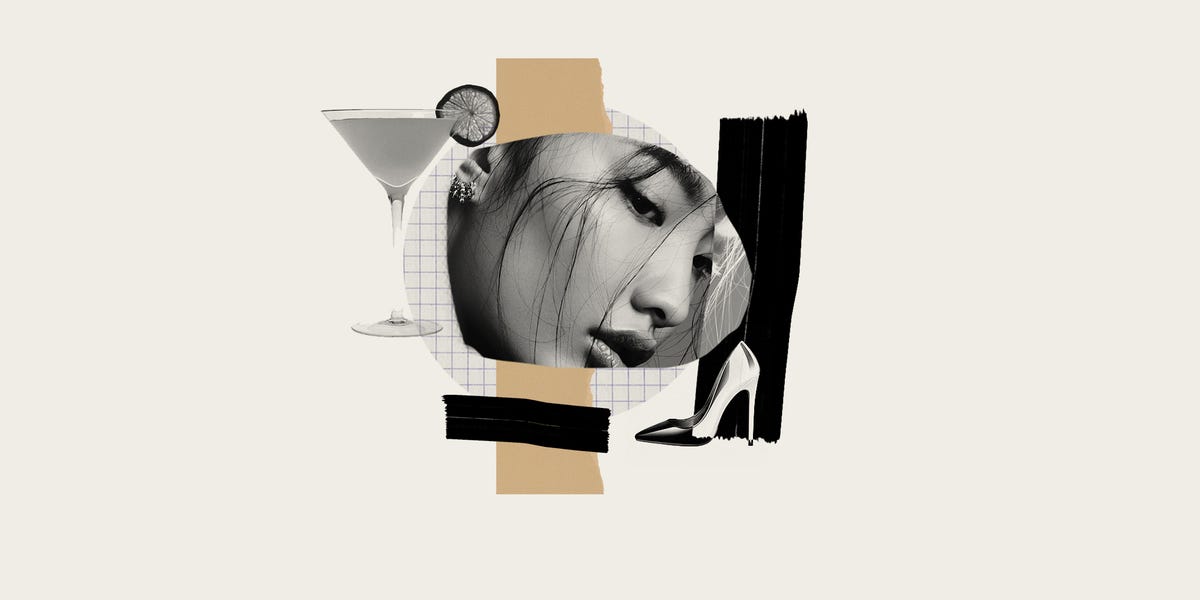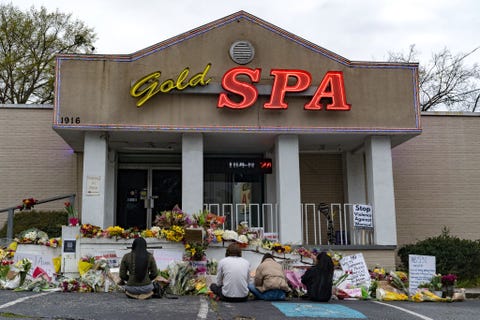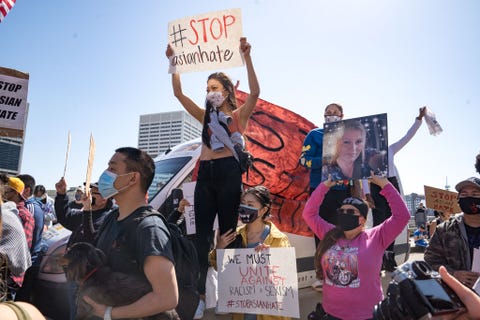I nursed my gimlet over the next hour, taking a sip every time he said something racist. Whatever he thought, I wasn’t going to play along, so I trained my eyes to the bottom of my glass as I drank, avoiding his awaiting gaze.
This was only the third in-person date I’d been on since joining Bumble in January, and despite my better judgment, I convinced myself to show up and give him the benefit of the doubt. Also, I was hurting.
It had been three weeks since the shootings in Atlanta that killed eight people, six of whom were women of Asian descent, at three spa locations. Eight lives were collapsed under a white man’s “bad day,” and we were just supposed to accept that.
And many people did, without so much as a second thought about what they might’ve internalized about Asian bodies. No one was returning to their anti-racism reading lists, thumbing through copies of How to Be an Antiracist purchased last summer. Rather, I saw thoughtful, painful essays from Asian American writers who had to perform the thankless task of defending the humanity of the slain while trying to process the tragedy for themselves.
Over the last year, attacks against Asians had become so mundane for us in America that it was hard to imagine this wound going any deeper. Over time, Asian Americans became fluent in exasperation, and I grew inured to my body tensing up every time I stepped outside my apartment.
But the hurt did deepen. And this time, it hit bone.
Before the murders, I had been dating someone. I’m embarrassed to admit how much I liked him in so short a time, a sweet and attentive guy fresh out of a long-term relationship and looking to see what—and who—was out there, much like myself.
Years of therapy separated my last relationship from my first foray on Bumble. I had done the work of healing from a man who relegated my needs beneath his own and deprioritized my safety behind his impulses. After two years, I was ready to pursue joy and explore someone new.
For someone who was only looking for “something casual,” he was kind and thoughtful. He celebrated the most minute details about me, things I considered unremarkable. On our first date (after both returning negative COVID-19 tests), we spent hours talking, quietly negotiating moments when touch was consensual and invited. My head on his shoulder. His arm around mine. Our knees meeting. It felt safe, and I didn’t think twice about it.
I quickly grew accustomed to his company; it became a reliable serotonin boost that broke up the monotony of lockdown. I delighted in how he made me feel—for the first time, possibly ever, I wasn’t ambivalent about someone. I let my excitement run wild.
What stayed with me after that infamous press briefing wasn’t the cruelty of trolls ridiculing the women’s deaths, or even the lingering residue of that sickening “temptation” narrative. It was the loneliness that their ruptured stories left behind. Who they were, whom and how they loved—we only knew fragments. We would learn later that one of the women, Feng Daoyou, was buried in a cemetery not far from where she was killed, after a funeral organized and attended by strangers. Her brother told NPR that, according to custom, an unmarried woman’s remains cannot enter her home village. She would never come home to her family.
Her brother wants to visit her grave in Atlanta someday, but he’s afraid to come.
I felt an aperture yawn open, all of the energy I had to remain vulnerable and brave slipping through.
My family wasn’t really talking about the shootings. They had no contingency plan other than to keep their heads down and continue surviving. Others in my universe didn’t know how to respond to me, so they just didn’t.
That same week, the guy I was dating met with his ex and unraveled. He said he needed time to clear his head. I knew I couldn’t ask anything of him—I didn’t know him well enough—but I wanted him to care about me as a human being, to see and care about the bright pain of my new heartbreak, and the immense weight pressing against my lungs as I carried myself through my days, pretending nothing was wrong.
I craved a response from someone, even if I had to provoke one.
I made a dark joke inviting him out to watch me drink until I could forget how disposable I was in this country. He responded gently, which I mistook for care. Even in his tepid response of, “I’m sorry you feel that way, shit’s not right,” there was more softness than what anyone had extended to me at the time. I thought that if I showed compassion toward his circumstance, maybe he’d return it.
“Sometimes,” Minari actor Steven Yeun said in a New York Times Magazine profile, “I wonder if the Asian American experience is what it’s like when you’re thinking about everyone else, but nobody else is thinking about you.”
I never heard from him again.
Less than two weeks later, grainy surveillance footage showed 65-year-old Vilma Kari ruthlessly attacked in front of a luxury apartment building in Midtown Manhattan. When her attacker finally relents, we see the building’s security personnel walk toward Kari, crumpled on the pavement outside, and close the door on her.
For days after, I sat with the thought that, any day now, a stranger could choose me. They could choose my parents, my loved ones. I waited.
I’d often catch myself fantasizing about who I would become when the moment finally came. Would my niece be able to recognize me after? Would I still belong to my parents? I could almost feel my skin breaking open against someone else’s rage—or delight. And if previous attacks were any indication, I probably wouldn’t even see it coming.
I retreated into the app and continued cycling through the infinite carousel of strangers. I wanted an escape. At the very least, behind a phone screen, I could appear just as uninhibited as everyone else. Entitled, even. I let my longing lead.
In my three-month stint on Bumble, I matched mostly with white guys. Only three of my matches were Asian: One immediately unmatched me as soon as I made contact. One exited during the initial warm-up exchange. And one, with whom I was already loosely acquainted, had a drink with me over Zoom. I told him to let me know if he wanted to “do this again sometime.” He didn’t get back in touch.
Once, I matched with a white guy who wrote in his profile that he “hates racism” but didn’t want to engage with me until we met up in person. After all, racism was abstract to him; he’s never had to worry about being hypervisible because of his race and gender in his life. He wasn’t showing up on this app bridled with the fear that I had tucked just behind my ribs.
When I expressed my discomfort, he unmatched me.
I started trying out different tones to communicate my safety concerns with my matches. More unmatched with me. Some feigned compassion, until they lost patience—or forgot my boundaries.
“We do not tolerate hate speech, racism, or bigotry of any kind,” Bumble assured users in a pop-up on the app after the murders. “If you engage in this behavior, you will be removed from the platform.” The company was vocal about “stopping Asian hate,” sharing resources on its Instagram Stories. But what remains illegible to the platform, and to those on it, are the many expressions hate can manifest in a racialized body—including desire.
There were so many bright red flags about this man that I’d dismissed because of that gendered trap of kindness: I didn’t want to appear rude to the only person I’d met on this godforsaken app who was willing to tolerate my reality. To the contrary, he seemed enthused to talk about it. (“Another Asian was attacked yesterday,” he once texted me). At least he was willing to acknowledge what others refused to, I reasoned.
Not long into our date, he told me about how his grandfather fought in the Pacific during World War II. Consequently, the man was racist against Asians and passed it down to his children. I can’t say what prompted this confession to me, an Asian person and descendant of a U.S. war in Asia.
He told me he only dates women of color, arguing with the fervor of a National Geographic explorer that not only are certain races overrepresented in the dating pool, but that he also benefited from intimate exposure to cultures he wouldn’t otherwise have access to. His last two relationships were with women of Cambodian and Filipino descent, respectively.
White women, he explained, are too bland. “They probably have the same story as me.” This amused me because he didn’t seem particularly interested in hearing my own story. He did most of the talking. “They’d have to be extraordinary for me to date them.”
For two hours, I ached for the date to end. So many times, I wanted to get up and leave, but I wasn’t confident that my fantasy would play out safely, and I was wearing heels. I didn’t want to provoke, as Jiayang Fan wrote, that hair trigger—that moment when “a smidgen of sexual interest transmutes into racist scorn” suffered verbally or physically. I didn’t want to take the chance to find out which.
For women of color, survival often requires mastering de-escalation tactics and learning how to make yourself smaller. And with the compounding misfortune of being perceived as a walking vector of disease for over a year, I’ve learned at least one thing: Don’t draw attention to yourself. Escape has to be discreet if you are to guarantee your own safety. Because, as I know good and damn well by now, Asians can be attacked in broad daylight, unprovoked and in full view of the public, and bystanders won’t intervene. Or, worse, they’ll close the door.
Not long after, I got off the app. I don’t have the bandwidth to date and watch my back at the same time. As much as I want to assert that I’m still entitled to my desire, now is not the time to want things.
As communities of color across the country continue to be besieged by violence and retraumatized with each new tragedy, I’m directing my energy toward our collective wellbeing, leaning into our shared, time-worn rituals for communal mourning, care, and safekeeping. Only there do I feel safe enough to show up as myself and, in that refuge, find my way back to some joy again.
This content is created and maintained by a third party, and imported onto this page to help users provide their email addresses. You may be able to find more information about this and similar content at piano.io


